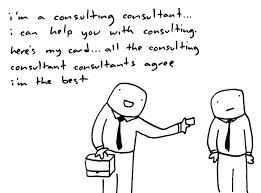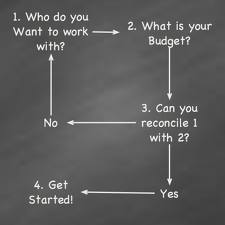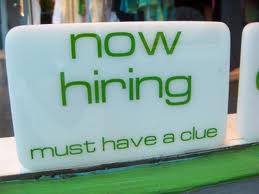 So you’ve decided you need a consultant, right? No? Not sure?
So you’ve decided you need a consultant, right? No? Not sure?
Well let’s tackle your decision before we get to the “how to hire the right consultant” question. Because actually, the decision of whether or not to hire a consultant is just as important to your overall satisfaction as is the hiring process itself. Click to Tweet
Many people experience angst when deciding whether to bring in outside expertise. After all, we consultants are right up there with lawyers in the ranks of professions who often get a bad rap. Therefore, we recommend you think about it like a business case: if you have a piece of important work that needs to be done, and either a) there is no one in your organization with the right skills to do it, or b) they aren’t available… then you need a consultant to help you. There’s just no way around it.
So now that’s taken care of. You need a consultant.
How then, do you go about finding one that won’t leave you feeling “shmoozed” and left with a bunch of expensive binders and documents that aren’t helpful and aren’t what you need?
Would it surprise you if I said it’s all in the process?
Well it’s true, and it’s really just a matter of asking and answering the right questions, in the right order.

- Do you have a realistic budget? This may seem self-evident, but you’d be surprised. Some organizations agree they have a budget but haven’t decided on exactly how much. Then, when they finally map out the work they want done, they find they can’t afford it. So first consider the budget. Then when you get to scoping and hiring, your expectations will be aligned with your budget.
- Have you decided whether you need Advice or Implementation? The distinction is important. Are you looking for a person(s) who can do a review and provide you with considered advice and best practices for comparison? Or do you already have a clear idea of what you want to do, and therefore you simply need someone to confirm your thoughts and then execute on the strategy? Perhaps you need both, and that’s fine – just remember they are very different skill sets.
- Have you clearly defined the outcomes you expect and the timelines in which you expect them? It’s dangerous to be vague in this area, and yet so tempting. We have read many proposal documents that ask for “high level plans” and completion “in the fourth quarter”. (By the way, good consultants will clarify these things via a scoping conversation.)
- Have you written a fantastic proposal? Many proposals are dozens of pages long depending on the industry and the sector. Most of them have a “core” section that describes the environment, the challenge, and the expectations as clearly as possible. The better this section is set out, the better the quality of responses you will get from potential consultants.
- Are you interviewing more than one candidate? Whether you are in the public sector and required to interview at least three, or in the private sector and can hire whomever you like, it’s important to keep your options open. Why? Because at the very least you will be able to determine a personality fit (which is a key to a successful relationship), and at best you will hear about potential approaches that you never even considered.
- Have you set out some on-going support and touch-points for the consultant once they start? It’s often the case that there is a kickoff meeting, a few introductions are made, and the consultant is then left to fend for him/herself. If you can provide a single-point-of-contact for them, set up a few touchpoint meetings in advance, and show your interest and support throughout (even if you assign the oversight to someone else), it goes a long way to building that trusting relationship, which is likely to make the consultant go that extra mile to make sure you’re happy (even delighted!).
We’d love to hear about your “consultant hiring” experiences. Please feel free to comment below, or Tweet us @whiteboardcons!
Until next time,
Ruth.

